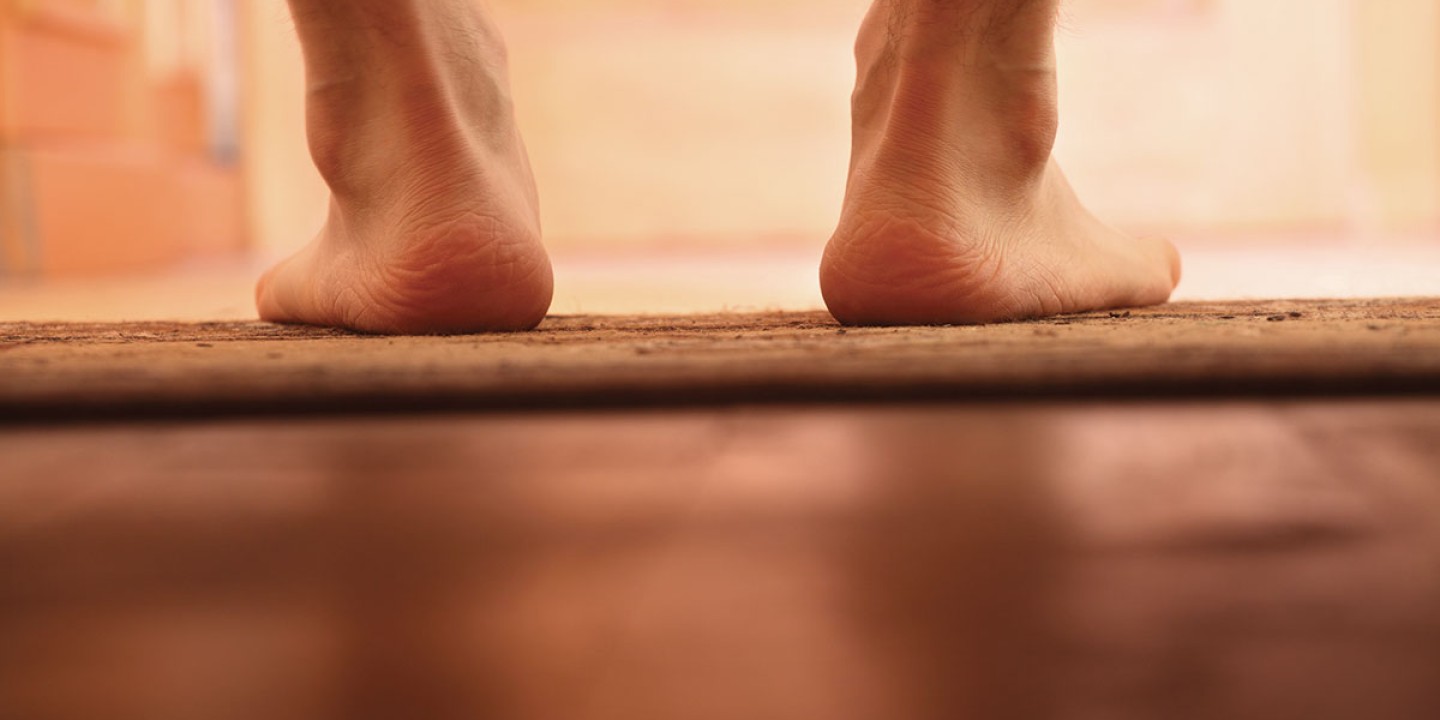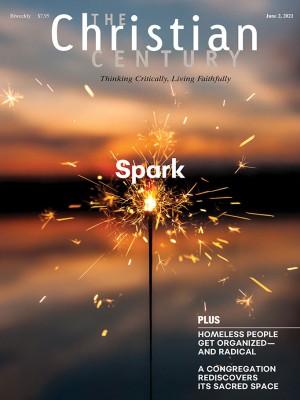Looking back at my ministry from hospice care
My feet hurt. To distract myself, I'm recalling my professional failures.

So my feet hurt. Well, my foot and two-thirds. The podiatrist tells me that blood-starved nerves cause pain and that, given my prognosis, amputation doesn’t make sense. I have a prescription, and it’s helping. Still, my feet hurt. All the time.
The pain sits just on the edge of real discomfort, which means that it can sap a lot of mental attention if I let it. The trick is not to. Stimulating conversation, a good book, or a cleverly written television show can provide just the right distraction.
Read our latest issue or browse back issues.
But I can distract my thoughts only so long before my brain nudges me and I think, Oh yeah, my feet hurt. So I have decided to use my pain as a spiritual exercise. Each time my brain reminds me of the pain, I will pray. I will close my eyes, let my spirit wander, and pray about whatever God sends spinning through my neurons and dancing upon my heart.
So far, it’s been going pretty well. God has me reviewing moments in my ministry that might have gone differently.
After 29 years, there’s lots to think about. I’ve been recalling things I should have done but didn’t and things I did and wish I hadn’t. I’ve returned to conversations, meetings, even to the construction of entire church buildings. There’s a lot to contemplate.
I remember the communion service when I sent the juice out before the bread. Only later did I understand the elders’ contorted expressions as subtle signals that something wasn’t right. For years after that, every time I served communion, my inner guide whispered, “The bread goes first, dumbass.”
I have several times been so anxious about a sermon that I skipped the choir anthem before it. You should have heard what my inner guide called me when I did that.
I have mispronounced names during baptisms, mumbled names uncertainly at weddings, and slaughtered difficult names in Bible readings. No one knew when I mispronounced Hebrew words, because there is only one way to pronounce difficult Hebrew words: with confidence.
Once, a groomsman fainted during a wedding ceremony and hit his head on the modesty rail going down. I tried to comfort the bride and groom while the bloody groomsman’s family led him away. The ceremony went on. Afterward I asked his mom about him. “Oh, he’s fine,” she responded nonchalantly. “His father passed out too, at our wedding.”
These memories are the easy distractions from my foot pain. Like fishing with marshmallows, they’re easy to catch and throw back. They provide only momentary distraction from my feet.
But God is also stirring recollections of a deeper, more tender sort, memories of much more serious importance. I am knocked asunder, remembering times when I missed the mark.
My inner guide reminds me of a woman, years ago, experiencing profound mental illness, and her husband, who endured the insults and stood valiantly by his wife nonetheless. I did my best to help, to say the right words, but I was in over my head. Nothing I said or did was particularly wise, I realize as I look back.
And what of the couple who came for marriage counseling when I was in my twenties, and I jabbered but said nothing and listened little? They never scheduled a second visit. Little wonder.
Let’s not begin to ponder the hundreds of people I’ve spoken with after weddings and funerals and banquets, people who rarely if ever attend church but found themselves suddenly talking to a minister and thought, “What the hell? I’ll talk about faith with this guy.” Did I say anything reasonably intelligent, offer some meager enticement to the religious life, some deeper encouragement about God’s presence in such moments of love and death and celebration?
I can see the faces of people I have bored, especially after long flights for conferences when I was scheduled to speak late in the evening. (I have never been a night person.) But let’s not make excuses. I have bored plenty of people on Sunday mornings, too, when I am supposedly at my best. What of the countless people who have shown up for weekly worship, hoping for some fresh bread, and I offered instead my soggy, unrisen thoughts?
I held a stillborn child once, and against official doctrine baptized her anyway. Could her mother see that I was fighting harder than anyone to hold my tears, to keep from being a distraction from the holiness of that moment?
When my friend lost his dear grandfather—the first major death in his life—did I say anything of meaning or comfort?
And the young, engaged couples I counseled, the handful I could see were headed to disaster; did I sufficiently warn them? Should I have simply refused to officiate their weddings?
What of the church building we expanded in the 1990s, when the congregation was vibrant and growing? Now the congregation is struggling, its classrooms dusty and abandoned. Was that a good use of God’s money?
How many times were my visions blurred, my insights inadequate, my words ill-considered? When did my ego delude me, my narcissism entertain me, my personal needs overshadow my concern for others?
When I contemplate such opportunities lost and moments missed, when I meditate upon the pain to which I have unintentionally contributed, I want to say to God, “Well, if that’s how you’re going to be, I think I’ll return to my feet. Thank you very much.”
But then my feet save me. They hurt, so I return to prayer, and God ushers me through this review again. And now I see that God is taking me somewhere beyond both the pain of my feet and the pain of my inadequacies.
Legacy is folly, I realize. I cannot control or know how I will be remembered. Most every human being now alive with any memory of me will be dead in 40 years, 60 tops. After that, memory of them will also pass quickly. The grass withers and the flower fades.
You might be thinking, What a downer! We fade from human memory. Little we do is long remembered.
I reply, No, no, you’re missing the point.
God remembers. God remembers and understands every misstep and mistake, every kindness and kiss, every gentleness offered and each betrayal scorned. God remembers my genuine efforts and my lackluster love. God recalls my authentic connections and the times I faked them. God sees all, knows all, remembers all—and embraces all. My life may be a small thing in the bigger picture, but it is part of a bigger picture, a dramatic tale of love and loss, an epic struggle in which humble people search for and find beauty and truth and grace.
Now I understand. My aching feet are dragging me to the breathtaking acknowledgment that only God remembers my every deed and misdeed and loves me anyway, that human legacy is most powerful not because it ages a thousand years but precisely because it lasts for just a brief splash of time, which is now. Right now. And the next moment, too, until the time comes to enter God’s forever light.
A version of this article appears in the print edition under the title “My feet are saving me.”





